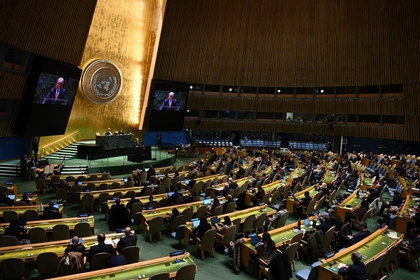A string of undersea cables being damaged in Europe is a result of accidents, not Russian sabotage, US and European intelligence officials said on condition of anonymity.
Three incidents over the past 18 months that saw vessels damaging undersea cables and gas pipelines in Europe – some by dragging anchors on seabeds – have led to suspicions that the Kremlin was to blame for the damages, especially against the backdrop of Russia’s alleged hybrid war against Europe using arson and explosions, according to Western agencies.
JOIN US ON TELEGRAM
Follow our coverage of the war on the @Kyivpost_official.
However, US intelligence officials told the Washington Post that intercepted communications and other classified material available to the investigators suggest the damages were caused by inexperienced crews serving aging vessels, with no evidence pointing towards Russian involvement.
Officials with two European intelligence services told the Washington Post that they concur with the US assessment.
The officials did not elaborate on the evidence available.
What happened?
Since Russia’s 2022 invasion of Ukraine, there have been multiple incidents where undersea cables and pipelines in Europe were damaged, including the Nord Stream incident in September 2022.
The most recent incident took place on Dec. 25, when a vessel damaged the EstLink 2 undersea power cable between Finland and Estonia by reportedly dragging its anchor. Finnish authorities later boarded and seized the vessel, detaining two Georgian crews onboard.

US Urges Backing of ‘Simple’ UN Resolution as Trump Calls for Putin-Zelensky Talks
The EU claimed the vessel was part of Russia’s “shadow fleet,” in which Moscow exports oil by using aging, uninsured vessels to bypass Western sanctions. The EU demanded more sanctions as a result.
The lawyer representing the vessel confirmed to the Washington Post that it was carrying Russian oil but denied any wrongdoing, including the sanction-busting allegations.
On Nov. 17, 2024, the Arelion telecommunications cable between the Swedish island of Gotland and Lithuania was cut. The next day, the C-Lion 1 submarine cable connecting Helsinki and the German port of Rostock was cut south of Sweden’s Oland island.
In October 2023, Sweden said an undersea telecom cable connected to Estonia was damaged around the same time the Finnish-Estonian Balticconnector gas pipeline was ruptured.
What do the experts say?
Following the Christmas Day incident off the coast of Finland, Berlin described it as a “wake-up call” for Europe, alleging Russia’s involvement, with Finnish President Alexander Stubb saying that the incident was “definitely” linked to Russia.
Speaking to the Washington Post, Eric Ciaramella, a senior fellow at the Carnegie Endowment for International Peace who previously served as the US’s deputy national intelligence officer for Russia, said the incidents might well be accidental, but “it’s hard to rule out a concerted Russian campaign” considering the Kremlin’s other operations in Europe.
Pekka Toveri, a Finnish politician who served as the country’s top military intelligence official, told the publication that the incidents and plausible deniability fit the pattern of Russia’s hybrid war on Europe, and claiming them as accidental “is total B.S.”
“The most important thing in any hybrid operation is deniability,” Toveri said, adding that Russia has dedicated military units for deep-sea operations, and the crew would have been aware of the anchor dragging immediately if it was in fact accidental.
Mike Plunkett, a naval expert at security research firm Janes, concurred with Toveri’s views in a comment to the Washington Post.
“... aside from a very loud splash, there will also be a lot of noise from the anchor chain paying out through the hawsehole,” Plunkett said before adding that it would still be difficult to prove it was intentional sabotage.
However, the Washington Post also questioned Moscow’s potential motive, arguing that the incidents would provoke more unfavorable sanctions against the Kremlin.
The investigation is “still open,” and “it is too early to make final conclusions of the causes or combinations behind the damages,” a spokesperson for Finland’s National Bureau of Investigation told the Washington Post.
You can also highlight the text and press Ctrl + Enter











